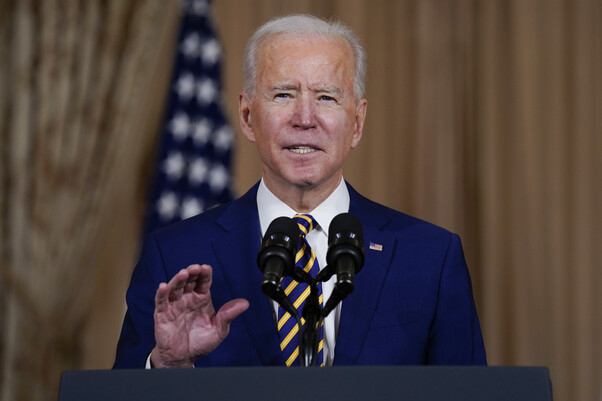Transition from’conflict intervention and confrontation’ to’diplomacy and intervention’
Saudi-led’Yemeni civil war intervention’ ceases support
Re-adjustment of Middle East Policy for’Saudi-oriented’… Positive signal to Iran

US President Joe Biden gives a speech on foreign policy at the State Department building on the 4th (local time). Washington/AP Yonhap News
US President Joe Biden said he would end support for the Yemeni civil war. This is a sign that the Biden administration will revise existing US foreign policy related to foreign dispute intervention. Immediately, the US-Iran relationship is expected to have a positive effect. This is because the United States and others intervened in the Yemeni civil war and made it the cause of Iran to support the Yemeni Huti rebels. President Biden visited the State Department on the 3rd and said, “The war must end in Yemen.” He also revealed the changed US position on other major foreign policy issues, such as the increase in the number of refugees in the US and the withdrawal of US troops in Germany. His remarks on that day came from his first foreign policy-related speech since his inauguration. Biden emphasized that “the United States is back,” and “diplomacy has returned to the center of our foreign policy,” implying that the United States will focus on diplomatic negotiations and compromises rather than intervention in conflict. “To highlight our promise, we are ending all US support for offensive operations, including the sale of related weapons in the Yemeni War,” he said. He stressed that the civil war in Yemen “created a humanitarian and strategic disaster.” President Biden has appointed Tim Renderking, a Middle Eastern expert and diplomat, as the new Yemeni envoy. This means that the United States will stop supporting Saudi Arabia-led intervention in the Yemeni civil war. It means to reset relations with Saudi Arabia in the Middle East. The United States, along with Britain and France, are supporting operations of the Saudi-led allied forces of eight Arab Sunni nations to defeat the Huti rebels and support government forces in the Yemeni civil war that erupted in 2014. Saudi Arabia is intervening in the Yemeni civil war at the level of anti-Iran, saying that the Huti rebels, a Shi’ite group, are supported by Iran, a Shi’ite endemic. The United States has also supported Saudi Arabia, the largest ally in the Middle East, while also supporting the intervention of the Yemeni civil war to contain Iran. The U.S. involvement in the civil war in Yemen has been criticized as a representative example of the U.S. excessive involvement in conflict. The involvement of Saudi Arabia and the US in the civil war in Yemen has been criticized for aggravating the humanitarian crisis. In particular, many pointed out that Saudi Arabia overstated the relationship between the Huti rebels and Iran, justifying intervention in the civil war. Some analysts say that Saudi intervention is rather triggering Iran’s involvement in the Huti rebels. Former US President Donald Trump, who announced that he would end the war in the Middle East, did not reduce his involvement in the civil war in Yemen, while reducing the number of US troops in the Middle East. Rather, Trump has strengthened relations with Saudi Arabia since taking office and intensified anti-Iran policy. With Biden’s announcement to stop intervening in the civil war in Yemen, the US policy in the Middle East is expected to change significantly. It is expected that the government will continue to push ahead with the Middle East conflict as it breaks away from the Saudi-centered policy that the former Trump administration has taken. The improvement in relations with Iran is also expected to take off in earnest. Biden has already announced that he will return to the’Comprehensive Joint Action Plan (JCPOA)’, an international nuclear agreement with Iran where Trump unilaterally withdrew after taking office. Biden’s announcement of stepping out of the Yemeni civil war, which was the reason for Iran’s intervention, is a positive signal to Iran and an indirect move to improve relations. The Biden administration already announced last week that it would waive sanctions for certain transactions involving the Hooty rebels. Last month, former Secretary of State Mike Pompeo identified the Hooty rebels as a’terrorist group’ and received criticism from the international community. Refugee groups have criticized these measures, impeding support for numerous refugees within the territory of the Houthi rebels, further aggravating the humanitarian crisis. As the civil war in Yemen continued for six years, 110,000 people died and more than 8 million refugees were out. Meanwhile, President Biden announced that he would significantly increase the number of refugees in the United States from 15,000 to 125,000 per year. The withdrawal of US troops from Germany, which Trump announced it would cut down to 12,000 people, is also frozen. President Biden said that the current level of US troops in Germany remains at about 36,000. He also promised to strengthen diplomatic involvement with Russia, but said he would not “get off” in matters related to Russia. It means that we will be tough to deal with Russia. Senior Reporter Eui-Gil Jung [email protected]
